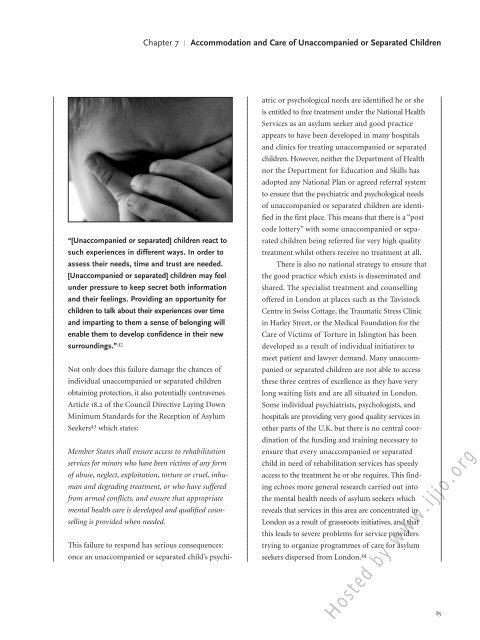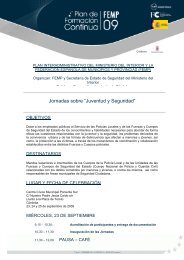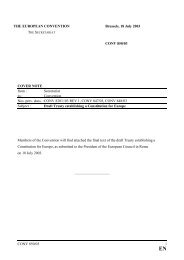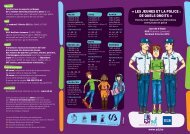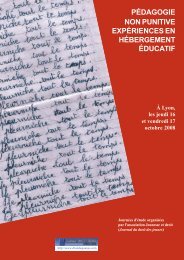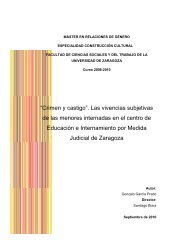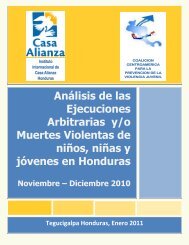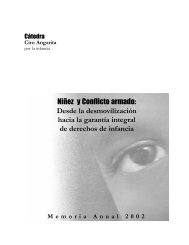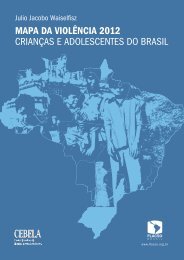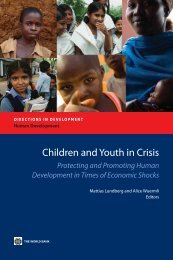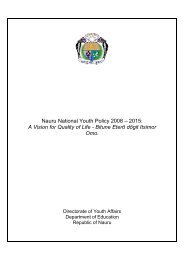Hosted by www.ijjo.org
Hosted by www.ijjo.org
Hosted by www.ijjo.org
You also want an ePaper? Increase the reach of your titles
YUMPU automatically turns print PDFs into web optimized ePapers that Google loves.
Chapter 7 | Accommodation and Care of Unaccompanied or Separated Children<br />
“[Unaccompanied or separated] children react to<br />
such experiences in different ways. In order to<br />
assess their needs, time and trust are needed.<br />
[Unaccompanied or separated] children may feel<br />
under pressure to keep secret both information<br />
and their feelings. Providing an opportunity for<br />
children to talk about their experiences over time<br />
and imparting to them a sense of belonging will<br />
enable them to develop confidence in their new<br />
surroundings.” 42<br />
Not only does this failure damage the chances of<br />
individual unaccompanied or separated children<br />
obtaining protection, it also potentially contravenes<br />
Article 18.2 of the Council Directive Laying Down<br />
Minimum Standards for the Reception of Asylum<br />
Seekers 43 which states:<br />
Member States shall ensure access to rehabilitation<br />
services for minors who have been victims of any form<br />
of abuse, neglect, exploitation, torture or cruel, inhuman<br />
and degrading treatment, or who have suffered<br />
from armed conflicts, and ensure that appropriate<br />
mental health care is developed and qualified counselling<br />
is provided when needed.<br />
This failure to respond has serious consequences:<br />
once an unaccompanied or separated child’s psychiatric<br />
or psychological needs are identified he or she<br />
is entitled to free treatment under the National Health<br />
Services as an asylum seeker and good practice<br />
appears to have been developed in many hospitals<br />
and clinics for treating unaccompanied or separated<br />
children. However, neither the Department of Health<br />
nor the Department for Education and Skills has<br />
adopted any National Plan or agreed referral system<br />
to ensure that the psychiatric and psychological needs<br />
of unaccompanied or separated children are identified<br />
in the first place. This means that there is a “post<br />
code lottery” with some unaccompanied or separated<br />
children being referred for very high quality<br />
treatment whilst others receive no treatment at all.<br />
There is also no national strategy to ensure that<br />
the good practice which exists is disseminated and<br />
shared. The specialist treatment and counselling<br />
offered in London at places such as the Tavistock<br />
Centre in Swiss Cottage, the Traumatic Stress Clinic<br />
in Harley Street, or the Medical Foundation for the<br />
Care of Victims of Torture in Islington has been<br />
developed as a result of individual initiatives to<br />
meet patient and lawyer demand. Many unaccompanied<br />
or separated children are not able to access<br />
these three centres of excellence as they have very<br />
long waiting lists and are all situated in London.<br />
Some individual psychiatrists, psychologists, and<br />
hospitals are providing very good quality services in<br />
other parts of the U.K. but there is no central coordination<br />
of the funding and training necessary to<br />
ensure that every unaccompanied or separated<br />
child in need of rehabilitation services has speedy<br />
access to the treatment he or she requires. This finding<br />
echoes more general research carried out into<br />
the mental health needs of asylum seekers which<br />
reveals that services in this area are concentrated in<br />
London as a result of grassroots initiatives, and that<br />
this leads to severe problems for service providers<br />
trying to <strong>org</strong>anize programmes of care for asylum<br />
seekers dispersed from London. 44 85<br />
<strong>Hosted</strong> <strong>by</strong> <strong>www</strong>.<strong>ijjo</strong>.<strong>org</strong>


